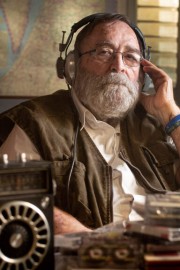Tantura
**Seen at the 2022 Sundance Film Festival.
It’s arguably the most human impulse we have- wanting to erase the past. Of course, nobody is infallible, everyone’s made mistakes, but some people would rather we forget about the worst things we’ve ever done. In his thought-provoking documentary, Alon Schwarz (figuratively) digs down to the lie at the heart of the formation of the state of Israel, and asks us to look objectively at what happened, and reflect on what might come from acknowledging our past sins rather than running from them.
Tantura is a village on the sea in Israel. At the time the state was formed in 1948, Palestinian tribes lived there. During the “War of Independence” of 1948, the town was seized by Israeli forces, and the Palestinians were driven off. That is the official story, however. Whispers and oral histories tell a different story, and decades later, a student’s thesis on Tantura, which was built on interviews of both Jewish and Palestinian people who were alive at the time, first brought the question of whether what happened at Tantura was not so much a battle, but an ethnic cleansing. Listening to his recordings, still preserved, makes it sure seem like what happened in Tantura was, indeed, what the Palestinians know as the Nakba (the Catastrophe).
The Israeli-Palestinian conflict is a complicated one, to say the least. “Tantura” tangles the string further, and adds a layer of academic intrigue in it by way of Teddy Katz, the student who wrote the paper about the village. Even before that part of the narrative comes up in Schwarz’s documentary, I couldn’t help but think about our own inability to wrestle with our shameful history, be it the genocide of the American Indians or slavery, especially when it comes to the disturbing controversy over “Critical Race Theory,” and the attempts to sanitize how we teach the past in schools. What’s particularly mind-blowing about Katz’s situation is how easily his own school turns on him in response to governmental pressure, even though he has witnesses on tape discussing what happened, although that many of them seem to conveniently forget what happened during the afternoon the day they were in Tantura seems like selective memory at work.
The film begins with four individuals who still live in Tantura; they remained, and having their words at the beginning and end of the film is part of why it is so impactful. That Schwarz was still able to find so many people alive, and aware, of the time to interview for this film is one of the most remarkable parts about it, and why it is an essential historical documentary to experience. If you’re expecting this to end with reconciliation of the matter, I’ll go ahead and burst your bubble; what you do end with is further evidence- however circumstantial- that maybe, one day, someone should finish Schwarz’s work in this film in real life, uncover what has been (literally) buried for too long. It certainly appears that many people are aware of where to look.











I read the review carefully until I got to the last paragraph. I absolutely agree that it is crucial to remember the “less photogenic” parts of the past so that the history would not repeat itself. However, the most important thing is to examine things in an objective (as much as possible) way and what you do in the last paragraph is a terrible manipulation that is shameful. Writing that “upwards to 750000 in the region was killed” is a blunt lie. There were people who were killed, there were actions of war crime, watch the movie to understand things better. However, the number you mention is absolutely absurd, the actual numbers are in several thousands (each and every one of which is a terrible tragedy). Hundreds of thousands of Palestinians were driven off or escaped fearing the Israeli army. Many hoped that this war, that was started by all the Arab nations around the newborn Israel will end with a defeat of the Jewish population and they will return. The Arabs lost in the war, and these refugees got stuck in the countries around Israel, mainly Jordan, Lebanon and Siria. By the way, during the same time, the Jews in the many Arab countries were persecuted and fled to Israel (around 750-850 thousand people). The Israeli-Palestinian conflict is a complicated one, and I am hopeful that it is solved during my lifetime. Lying about Israeli army killing 750000 Arabs durning this war is shameful and will only delay this peace we hope for. And also, it need to be mentioned that this movie is created by Jewish Israelis, looking back and trying to better understand what happened, without being afraid of taking responsibility for our past. I wish there were some Arab film makers that can reflect the same way of the bloody Arab Jewish history in Palestine (long before the state of Israel was established) and acknowledge their past the same way the Jews do today.
Thank you very much for taking the time to comment. It is entirely possible that I misheard the number as I was watching the film last night. I will adjust my review accordingly so as not to risk spreading such a falsehood.
https://ifamericansknew.org/history/wars.html
https://www.jewishvirtuallibrary.org/total-casualties-arab-israeli-conflict
How many Arabs died in the Arab-Israeli war?
1920–1948
Conflicts prior to Israel’s independence Actors involved Total deaths
1936–1939 Arab revolt in Palestine British Army, Haganah, Arab High Command. 5,000
Palestine Civil War British Army, Army of the Holy War, Arab Liberation Army, Irgun, Haganah, Palmach. At least 720
How many Arabs died in 1948?
The Deir Yassin massacre took place on April 9, 1948, when around 130 fighters from the Far-right Zionist paramilitary groups Irgun and Lehi killed at least 107 Palestinian Arabs, including women and children, in Deir Yassin, a village of roughly 600 people near Jerusalem.